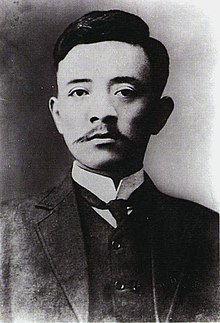Song Jiaoren
| Song Jiaoren 宋教仁 |
|
|---|---|
 |
|
| President of Kuomintang | |
|
In office 1912–1913 |
|
| Preceded by | N/A (first president) |
| Succeeded by | Sun Yat-sen |
| Vice President of Huaxinghui | |
|
In office 15 February 1904 – 30 July 1905 |
|
| Preceded by | N/A (party established) |
| Succeeded by | N/A (merged with Tongmenghui) |
| Personal details | |
| Born |
5 April 1882 Taoyuan, Hunan, Qing Dynasty |
| Died | 22 March 1913 (aged 30) Shanghai, Jiangsu, Republic of China |
| Political party |
Huaxinghui Tongmenghui Kuomingtang |
Song Jiaoren (Chinese: 宋教仁; pinyin: Sòng Jiàorén; Wade–Giles: Sung Chiao-jen; Given name at birth: Liàn 鍊; Courtesy name: Dùnchū 鈍初) (5 April 1882 – 22 March 1913) was a Chinese republican revolutionary, political leader and a founder of the Kuomintang (KMT). He was assassinated in 1913 after leading his Kuomintang party to victory in China's first democratic elections. Evidence strongly implied that China's provisional president, Yuan Shikai, was responsible for his assassination.
Song Jiaoren was born and educated in Hunan. When he was six years old, Song Jiaoren began his education at a private school. When Song was seventeen years old, he graduated and began enrollment at Taoyuan Zhangjiang College. Due to the influence of his teachers, Huang Shouyi and Qu Fangmei, Song made no effort to pursue the civil service examinations, and was interested mainly in world events and the counterculture of his time. Song received excellent grades in college.
In August 1902, Song Jiaoren went to Wuchang to attend The Bishop Boone Memorial School(now Central China Normal University), and in Wuchang, he met the revolutionary Huang Xing, and the two quickly became lifelong friends. Huang was soon forced to leave Wuchang due to his revolutionary activities, and returned to his hometown of Changsha. After Huang left, Song continued his organization of revolutionary groups in Hunan, especially in Changsha and Changde.
Later in 1902, Song was recruited to teach at the Wuchang Normal School, a prestigious private secondary school. Song arrived in Wuchang and began teaching in 1903. In Wuhan, Song became involved with various local revolutionary groups. The Wuchang Garden Hill Party especially appealed to him. Song often discussed politics and revolution with his students, many of whom were opposed to the idea of revolution.
...
Wikipedia
